2024年中考英语高频考点精讲-简单句和并列句(无答案)
文档属性
| 名称 | 2024年中考英语高频考点精讲-简单句和并列句(无答案) |
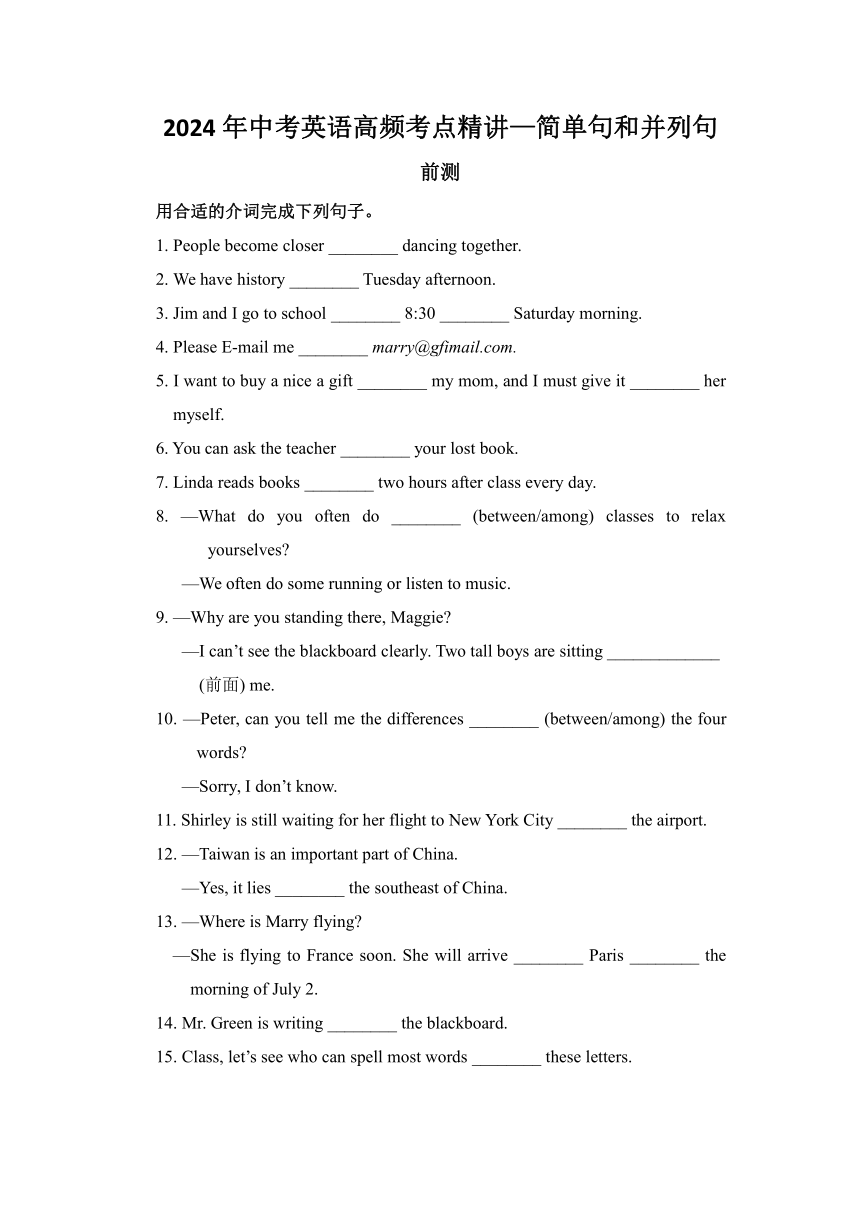
|
|
| 格式 | docx | ||
| 文件大小 | 198.7KB | ||
| 资源类型 | 教案 | ||
| 版本资源 | 通用版 | ||
| 科目 | 英语 | ||
| 更新时间 | 2024-03-05 20:15:05 | ||
图片预览

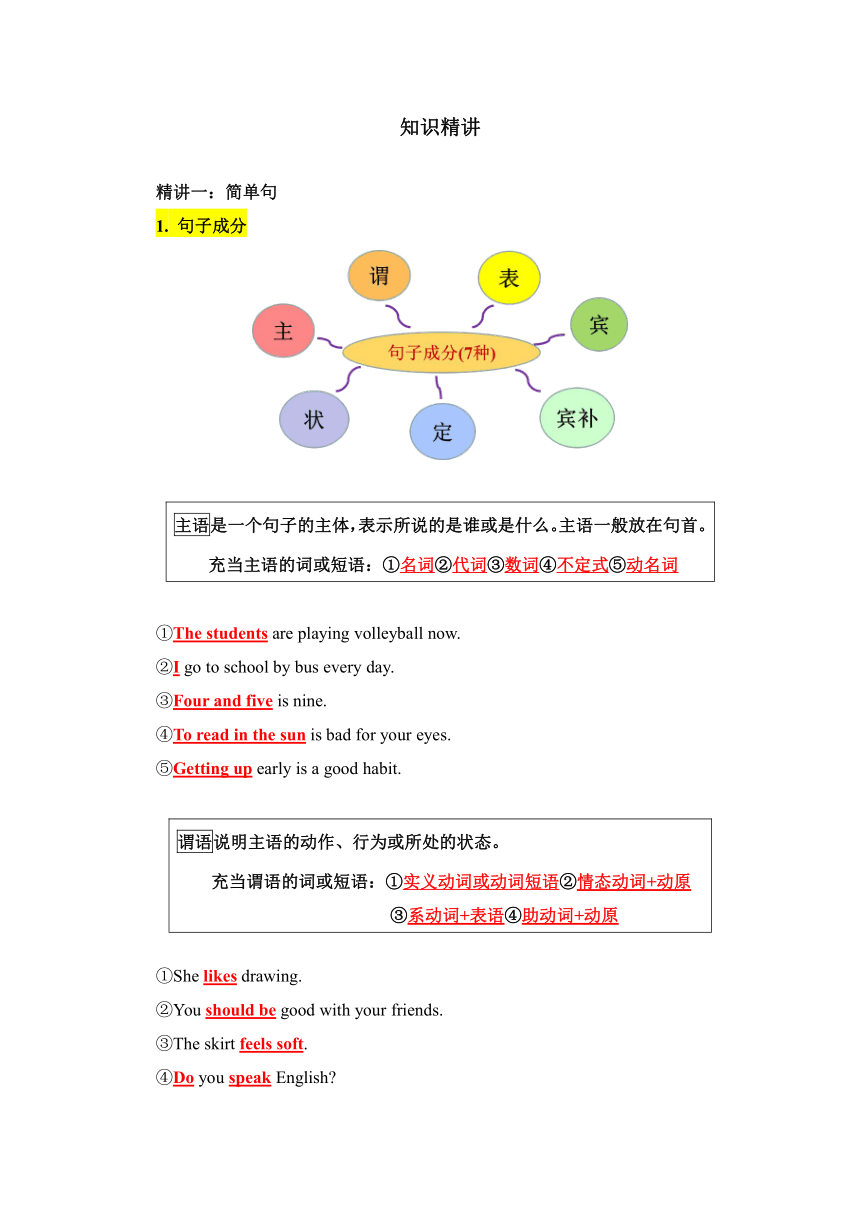
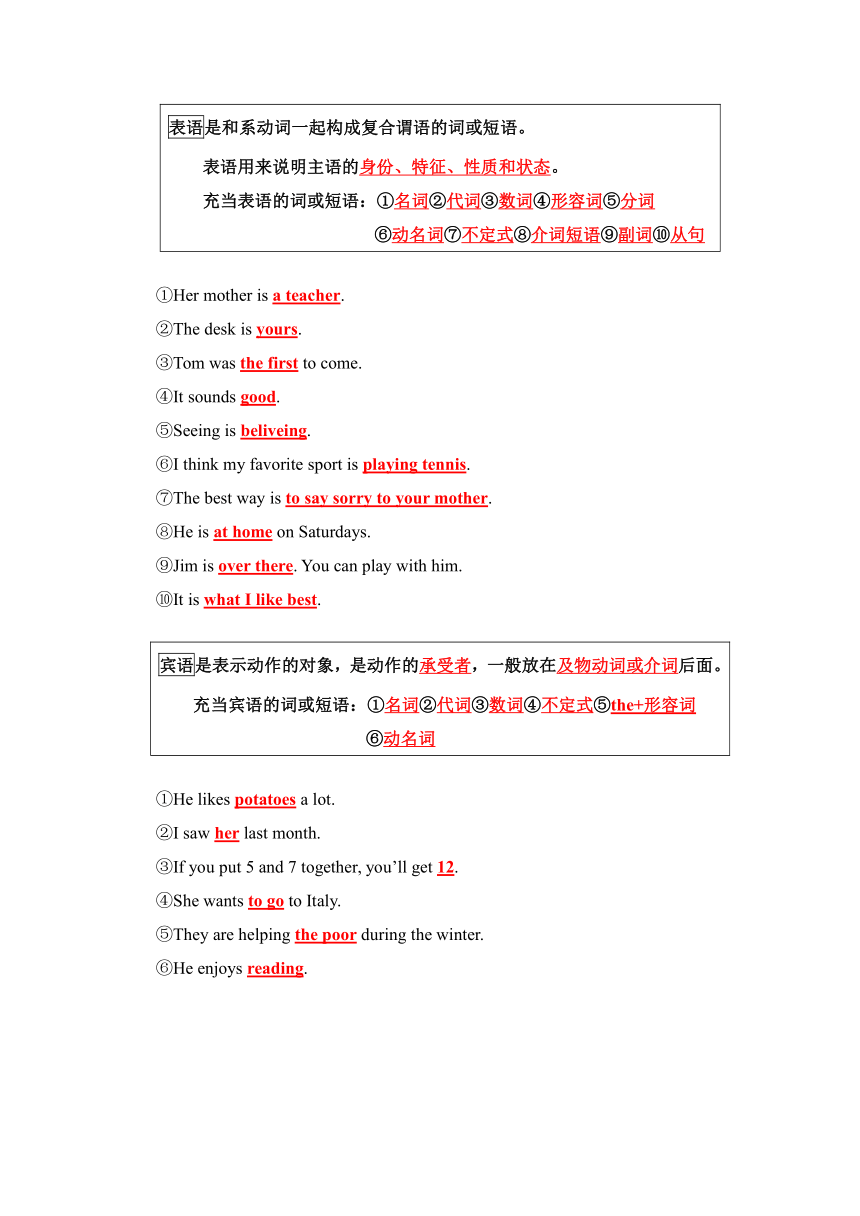
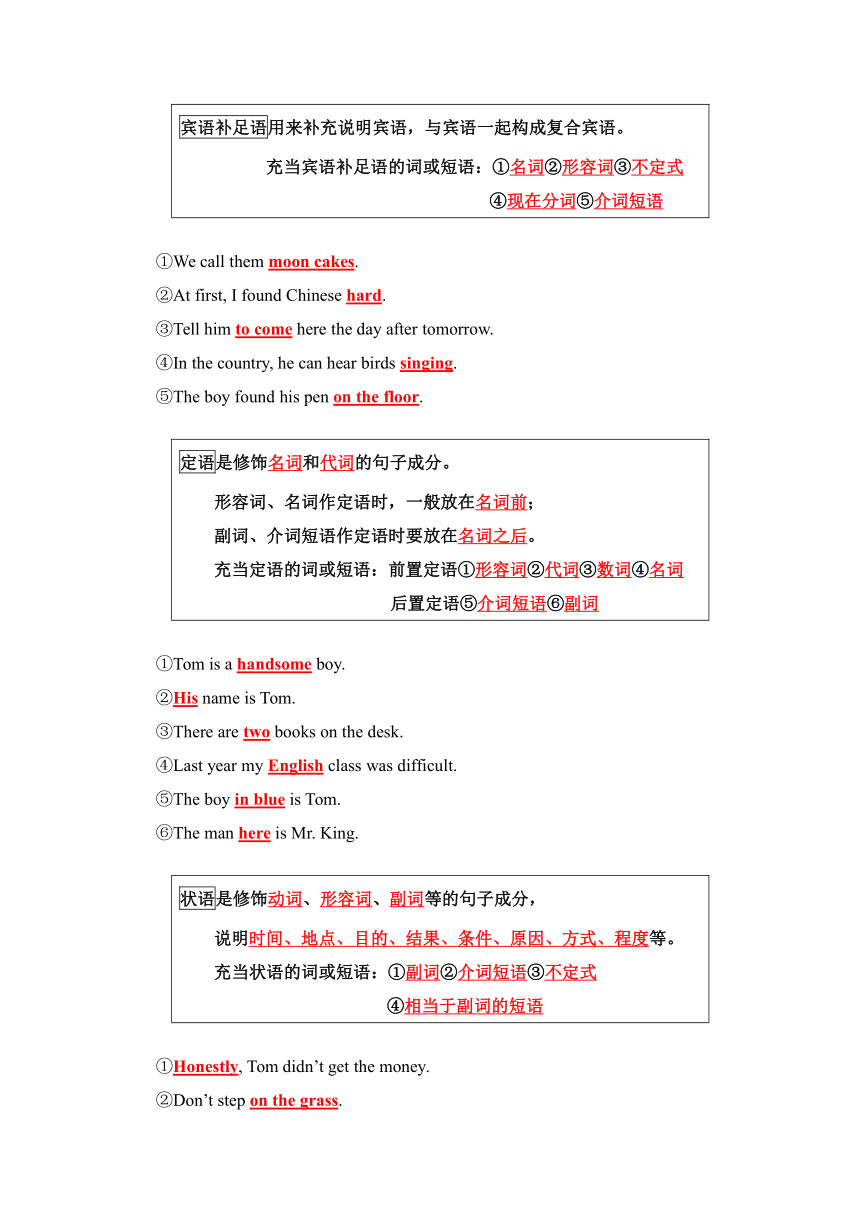
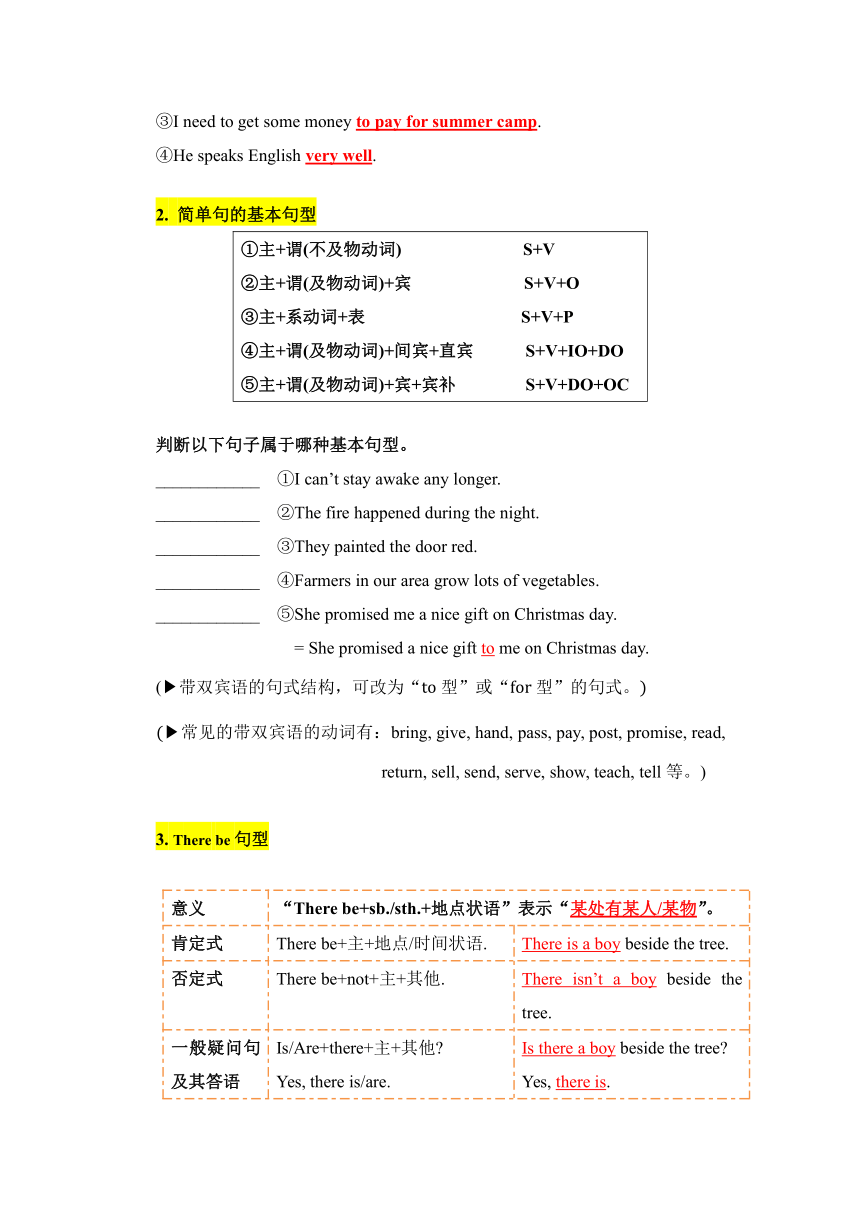
文档简介
2024年中考英语高频考点精讲—简单句和并列句
前测
用合适的介词完成下列句子。
1. People become closer ________ dancing together.
2. We have history ________ Tuesday afternoon.
3. Jim and I go to school ________ 8:30 ________ Saturday morning.
4. Please E-mail me ________ marry@.
5. I want to buy a nice a gift ________ my mom, and I must give it ________ her myself.
6. You can ask the teacher ________ your lost book.
7. Linda reads books ________ two hours after class every day.
8. —What do you often do ________ (between/among) classes to relax yourselves
—We often do some running or listen to music.
9. —Why are you standing there, Maggie
—I can’t see the blackboard clearly. Two tall boys are sitting _____________
(前面) me.
10. —Peter, can you tell me the differences ________ (between/among) the four words
—Sorry, I don’t know.
11. Shirley is still waiting for her flight to New York City ________ the airport.
12. —Taiwan is an important part of China.
—Yes, it lies ________ the southeast of China.
13. —Where is Marry flying
—She is flying to France soon. She will arrive ________ Paris ________ the morning of July 2.
14. Mr. Green is writing ________ the blackboard.
15. Class, let’s see who can spell most words ________ these letters.
知识精讲
精讲一:简单句
1. 句子成分
主语是一个句子的主体,表示所说的是谁或是什么。主语一般放在句首。 充当主语的词或短语:①名词②代词③数词④不定式⑤动名词
①The students are playing volleyball now.
②I go to school by bus every day.
③Four and five is nine.
④To read in the sun is bad for your eyes.
⑤Getting up early is a good habit.
谓语说明主语的动作、行为或所处的状态。 充当谓语的词或短语:①实义动词或动词短语②情态动词+动原 ③系动词+表语④助动词+动原
①She likes drawing.
②You should be good with your friends.
③The skirt feels soft.
④Do you speak English
表语是和系动词一起构成复合谓语的词或短语。 表语用来说明主语的身份、特征、性质和状态。 充当表语的词或短语:①名词②代词③数词④形容词⑤分词 ⑥动名词⑦不定式⑧介词短语⑨副词⑩从句
①Her mother is a teacher.
②The desk is yours.
③Tom was the first to come.
④It sounds good.
⑤Seeing is beliveing.
⑥I think my favorite sport is playing tennis.
⑦The best way is to say sorry to your mother.
⑧He is at home on Saturdays.
⑨Jim is over there. You can play with him.
⑩It is what I like best.
宾语是表示动作的对象,是动作的承受者,一般放在及物动词或介词后面。 充当宾语的词或短语:①名词②代词③数词④不定式⑤the+形容词 ⑥动名词
①He likes potatoes a lot.
②I saw her last month.
③If you put 5 and 7 together, you’ll get 12.
④She wants to go to Italy.
⑤They are helping the poor during the winter.
⑥He enjoys reading.
宾语补足语用来补充说明宾语,与宾语一起构成复合宾语。 充当宾语补足语的词或短语:①名词②形容词③不定式 ④现在分词⑤介词短语
①We call them moon cakes.
②At first, I found Chinese hard.
③Tell him to come here the day after tomorrow.
④In the country, he can hear birds singing.
⑤The boy found his pen on the floor.
定语是修饰名词和代词的句子成分。 形容词、名词作定语时,一般放在名词前; 副词、介词短语作定语时要放在名词之后。 充当定语的词或短语:前置定语①形容词②代词③数词④名词 后置定语⑤介词短语⑥副词
①Tom is a handsome boy.
②His name is Tom.
③There are two books on the desk.
④Last year my English class was difficult.
⑤The boy in blue is Tom.
⑥The man here is Mr. King.
状语是修饰动词、形容词、副词等的句子成分, 说明时间、地点、目的、结果、条件、原因、方式、程度等。 充当状语的词或短语:①副词②介词短语③不定式 ④相当于副词的短语
①Honestly, Tom didn’t get the money.
②Don’t step on the grass.
③I need to get some money to pay for summer camp.
④He speaks English very well.
2. 简单句的基本句型
①主+谓(不及物动词) S+V ②主+谓(及物动词)+宾 S+V+O ③主+系动词+表 S+V+P ④主+谓(及物动词)+间宾+直宾 S+V+IO+DO ⑤主+谓(及物动词)+宾+宾补 S+V+DO+OC
判断以下句子属于哪种基本句型。
____________ ①I can’t stay awake any longer.
____________ ②The fire happened during the night.
____________ ③They painted the door red.
____________ ④Farmers in our area grow lots of vegetables.
____________ ⑤She promised me a nice gift on Christmas day.
= She promised a nice gift to me on Christmas day.
( 带双宾语的句式结构,可改为“to型”或“for型”的句式。)
( 常见的带双宾语的动词有:bring, give, hand, pass, pay, post, promise, read, return, sell, send, serve, show, teach, tell等。)
3. There be句型
意义 “There be+sb./sth.+地点状语”表示“某处有某人/某物”。
肯定式 There be+主+地点/时间状语. There is a boy beside the tree.
否定式 There be+not+主+其他. There isn’t a boy beside the tree.
一般疑问句及其答语 Is/Are+there+主+其他 Yes, there is/are. No, there isn’t/aren’t. Is there a boy beside the tree Yes, there is. No, there isn’t.
特殊疑问句 特殊疑问词+be(+there) +其他 Who is beside the tree
be动词必须和主语保持人称和数的一致。如果主语部分是 两个或两个以上的并列主语,be动词要和邻近主语的数和人称保持一致,即遵循“就近原则”。
①There ______ a pen on the desk.
②There ______ a pen and two books on the desk.
③There ______ two boys and a girl in the room.
即时训练
一、判断下列句子属于哪种句型
A. S+V B. S+V+O C. S+V+P D. S+V+IO+DO E. S+V+DO+OC
( ) 1. I like French fries.
( ) 2. My father often tells me stories.
( ) 3. Tom asks me to have dinner with him.
( ) 4. He runs everyday.
( ) 5. The food tastes delicious.
二、根据括号中所给的中文提示或词完成句子
1. There ______ (is/are) a sofa and two beds in the bedroom.
2. There ______ (is/are) some milk in the glass.
3. There ______ (is/are) some pears and a watermelon in it.
4. ______ (Is/Are) there any oranges in the basket
5. There are some trees near the house. (否定句)
There ______ ______ trees near the house.
6. There are some apples in the bag. (一般疑问句)
______ there ______ apples in the bag
精讲二:并列句
1. 并列关系
①and: “_______” ②both…and…:“___________” ③either…or…:“___________________” ④neither…nor…:“_______________________” ⑤not only…but also…:“__________________”
①I am a teacher and he is a doctor.
②He can play both the piano and the guitar.
③Either you or he is wrong.
④Neither I nor he has seen the film.
⑤Not only you but also he wants to go hiking.
2. 转折关系
①but:“________” ②yet:“_______”,相当于but ③while: “______”
①It’s hot in summer here, but it is not cold in winter.
②He worked hard, yet he failed.
③He is tall while his sister is short.
3. 选择关系
or:①“_________”②“_____________” either … or …: ③“___________________”
①You can watch TV or you can play computer games.
②Hurry up, or you’ll be late.
③Either he could not come or he did not want to.
4. 因果关系
①so:“________” ②for:“________”
①The dress was very expensive, so I didn’t buy it.
②Mike must be at home, for the light in his room is on.
即时训练
将所给的单词分别填入下列句子的空格中,使句子正确通顺,词语使用次数不限。
and but or so not only…but (also)
1. Speak slowly, _________ think quickly.
2. Understand rules completely _________ change them reasonably.
3. She was badly ill, _________ she went to see the doctor.
4. _________ is the little girl smart, _________ she studies hard.
5. Hurry up, _________ you will be late for school.
后测
( ) 1. —Are there any _______ in the picture
—Yes, there are.
A. fish B. pork C. beef D. meat
( ) 2. There _______ a pair of shoes under the bed. The shoes _______ mine.
A. is; are B. are; is C. is; is D. are; are
( ) 3. —I hear Susan will go to Beijing by herself.
—That’s true. _______ her father _______ her mother will go with her.
A. Both; and B. Either; or
C. Neither; nor D. Not only; but also
( ) 4. —Can you come to my birthday party tomorrow evening
—I’d love to, _______ I’m quite busy this week.
A. and B. so C. but D. for
( ) 5. —Is there any outdoor learning in your school
—_______. We learn outdoors once or twice every month.
A. Yes, there is B. No, there isn’t
C. Yes, it is D. No, it isn’t
( ) 6. There _______ a basketball match in our school this afternoon.
A. will have B. will be
C. is going to have D. are going to have
( ) 7. Look! There _______ a photo of our English teacher in today's newspaper!
A. is B. are C. have D. has
( ) 8. I can’t watch TV on school nights, ________ I can watch TV on weekends.
A. and B. but C. if D. or
( ) 9. —I don’t like reading ________ watching TV. What about you
—I don't like reading all day, ________ I like watching TV news.
A. and; or B. and; and C. or; and D. or; but
( ) 10. ________ my sister ________ I do well in our lessons. My mother is very proud of us.
A. Not; but B. Neither; nor C. Either; or D. Both; and
( ) 11. —My parents are crazy about Running Man. How about your parents
—________ my dad ________ my mom likes it. They prefer The Reader.
A. Neither; nor B. Both; and
C. Either; or D. Not only; but also
( ) 12. It’s not always safe to pay over the Internet, ________ you should be careful.
A. so B. after C. because D. as soon as
( ) 13. ________ Lily is only five years old, ________ she can swim very well.
A. Though; but B. Because; so C. Though; / D. As; /
( ) 14. —I want to be a teacher when I grow up.
—Work hard, ________ your dream will come true.
A. or B. but C. though D. and
( ) 15. We must get back to work, ________ we won’t finish everything.
A. and B. but C. so D. or
前测
用合适的介词完成下列句子。
1. People become closer ________ dancing together.
2. We have history ________ Tuesday afternoon.
3. Jim and I go to school ________ 8:30 ________ Saturday morning.
4. Please E-mail me ________ marry@.
5. I want to buy a nice a gift ________ my mom, and I must give it ________ her myself.
6. You can ask the teacher ________ your lost book.
7. Linda reads books ________ two hours after class every day.
8. —What do you often do ________ (between/among) classes to relax yourselves
—We often do some running or listen to music.
9. —Why are you standing there, Maggie
—I can’t see the blackboard clearly. Two tall boys are sitting _____________
(前面) me.
10. —Peter, can you tell me the differences ________ (between/among) the four words
—Sorry, I don’t know.
11. Shirley is still waiting for her flight to New York City ________ the airport.
12. —Taiwan is an important part of China.
—Yes, it lies ________ the southeast of China.
13. —Where is Marry flying
—She is flying to France soon. She will arrive ________ Paris ________ the morning of July 2.
14. Mr. Green is writing ________ the blackboard.
15. Class, let’s see who can spell most words ________ these letters.
知识精讲
精讲一:简单句
1. 句子成分
主语是一个句子的主体,表示所说的是谁或是什么。主语一般放在句首。 充当主语的词或短语:①名词②代词③数词④不定式⑤动名词
①The students are playing volleyball now.
②I go to school by bus every day.
③Four and five is nine.
④To read in the sun is bad for your eyes.
⑤Getting up early is a good habit.
谓语说明主语的动作、行为或所处的状态。 充当谓语的词或短语:①实义动词或动词短语②情态动词+动原 ③系动词+表语④助动词+动原
①She likes drawing.
②You should be good with your friends.
③The skirt feels soft.
④Do you speak English
表语是和系动词一起构成复合谓语的词或短语。 表语用来说明主语的身份、特征、性质和状态。 充当表语的词或短语:①名词②代词③数词④形容词⑤分词 ⑥动名词⑦不定式⑧介词短语⑨副词⑩从句
①Her mother is a teacher.
②The desk is yours.
③Tom was the first to come.
④It sounds good.
⑤Seeing is beliveing.
⑥I think my favorite sport is playing tennis.
⑦The best way is to say sorry to your mother.
⑧He is at home on Saturdays.
⑨Jim is over there. You can play with him.
⑩It is what I like best.
宾语是表示动作的对象,是动作的承受者,一般放在及物动词或介词后面。 充当宾语的词或短语:①名词②代词③数词④不定式⑤the+形容词 ⑥动名词
①He likes potatoes a lot.
②I saw her last month.
③If you put 5 and 7 together, you’ll get 12.
④She wants to go to Italy.
⑤They are helping the poor during the winter.
⑥He enjoys reading.
宾语补足语用来补充说明宾语,与宾语一起构成复合宾语。 充当宾语补足语的词或短语:①名词②形容词③不定式 ④现在分词⑤介词短语
①We call them moon cakes.
②At first, I found Chinese hard.
③Tell him to come here the day after tomorrow.
④In the country, he can hear birds singing.
⑤The boy found his pen on the floor.
定语是修饰名词和代词的句子成分。 形容词、名词作定语时,一般放在名词前; 副词、介词短语作定语时要放在名词之后。 充当定语的词或短语:前置定语①形容词②代词③数词④名词 后置定语⑤介词短语⑥副词
①Tom is a handsome boy.
②His name is Tom.
③There are two books on the desk.
④Last year my English class was difficult.
⑤The boy in blue is Tom.
⑥The man here is Mr. King.
状语是修饰动词、形容词、副词等的句子成分, 说明时间、地点、目的、结果、条件、原因、方式、程度等。 充当状语的词或短语:①副词②介词短语③不定式 ④相当于副词的短语
①Honestly, Tom didn’t get the money.
②Don’t step on the grass.
③I need to get some money to pay for summer camp.
④He speaks English very well.
2. 简单句的基本句型
①主+谓(不及物动词) S+V ②主+谓(及物动词)+宾 S+V+O ③主+系动词+表 S+V+P ④主+谓(及物动词)+间宾+直宾 S+V+IO+DO ⑤主+谓(及物动词)+宾+宾补 S+V+DO+OC
判断以下句子属于哪种基本句型。
____________ ①I can’t stay awake any longer.
____________ ②The fire happened during the night.
____________ ③They painted the door red.
____________ ④Farmers in our area grow lots of vegetables.
____________ ⑤She promised me a nice gift on Christmas day.
= She promised a nice gift to me on Christmas day.
( 带双宾语的句式结构,可改为“to型”或“for型”的句式。)
( 常见的带双宾语的动词有:bring, give, hand, pass, pay, post, promise, read, return, sell, send, serve, show, teach, tell等。)
3. There be句型
意义 “There be+sb./sth.+地点状语”表示“某处有某人/某物”。
肯定式 There be+主+地点/时间状语. There is a boy beside the tree.
否定式 There be+not+主+其他. There isn’t a boy beside the tree.
一般疑问句及其答语 Is/Are+there+主+其他 Yes, there is/are. No, there isn’t/aren’t. Is there a boy beside the tree Yes, there is. No, there isn’t.
特殊疑问句 特殊疑问词+be(+there) +其他 Who is beside the tree
be动词必须和主语保持人称和数的一致。如果主语部分是 两个或两个以上的并列主语,be动词要和邻近主语的数和人称保持一致,即遵循“就近原则”。
①There ______ a pen on the desk.
②There ______ a pen and two books on the desk.
③There ______ two boys and a girl in the room.
即时训练
一、判断下列句子属于哪种句型
A. S+V B. S+V+O C. S+V+P D. S+V+IO+DO E. S+V+DO+OC
( ) 1. I like French fries.
( ) 2. My father often tells me stories.
( ) 3. Tom asks me to have dinner with him.
( ) 4. He runs everyday.
( ) 5. The food tastes delicious.
二、根据括号中所给的中文提示或词完成句子
1. There ______ (is/are) a sofa and two beds in the bedroom.
2. There ______ (is/are) some milk in the glass.
3. There ______ (is/are) some pears and a watermelon in it.
4. ______ (Is/Are) there any oranges in the basket
5. There are some trees near the house. (否定句)
There ______ ______ trees near the house.
6. There are some apples in the bag. (一般疑问句)
______ there ______ apples in the bag
精讲二:并列句
1. 并列关系
①and: “_______” ②both…and…:“___________” ③either…or…:“___________________” ④neither…nor…:“_______________________” ⑤not only…but also…:“__________________”
①I am a teacher and he is a doctor.
②He can play both the piano and the guitar.
③Either you or he is wrong.
④Neither I nor he has seen the film.
⑤Not only you but also he wants to go hiking.
2. 转折关系
①but:“________” ②yet:“_______”,相当于but ③while: “______”
①It’s hot in summer here, but it is not cold in winter.
②He worked hard, yet he failed.
③He is tall while his sister is short.
3. 选择关系
or:①“_________”②“_____________” either … or …: ③“___________________”
①You can watch TV or you can play computer games.
②Hurry up, or you’ll be late.
③Either he could not come or he did not want to.
4. 因果关系
①so:“________” ②for:“________”
①The dress was very expensive, so I didn’t buy it.
②Mike must be at home, for the light in his room is on.
即时训练
将所给的单词分别填入下列句子的空格中,使句子正确通顺,词语使用次数不限。
and but or so not only…but (also)
1. Speak slowly, _________ think quickly.
2. Understand rules completely _________ change them reasonably.
3. She was badly ill, _________ she went to see the doctor.
4. _________ is the little girl smart, _________ she studies hard.
5. Hurry up, _________ you will be late for school.
后测
( ) 1. —Are there any _______ in the picture
—Yes, there are.
A. fish B. pork C. beef D. meat
( ) 2. There _______ a pair of shoes under the bed. The shoes _______ mine.
A. is; are B. are; is C. is; is D. are; are
( ) 3. —I hear Susan will go to Beijing by herself.
—That’s true. _______ her father _______ her mother will go with her.
A. Both; and B. Either; or
C. Neither; nor D. Not only; but also
( ) 4. —Can you come to my birthday party tomorrow evening
—I’d love to, _______ I’m quite busy this week.
A. and B. so C. but D. for
( ) 5. —Is there any outdoor learning in your school
—_______. We learn outdoors once or twice every month.
A. Yes, there is B. No, there isn’t
C. Yes, it is D. No, it isn’t
( ) 6. There _______ a basketball match in our school this afternoon.
A. will have B. will be
C. is going to have D. are going to have
( ) 7. Look! There _______ a photo of our English teacher in today's newspaper!
A. is B. are C. have D. has
( ) 8. I can’t watch TV on school nights, ________ I can watch TV on weekends.
A. and B. but C. if D. or
( ) 9. —I don’t like reading ________ watching TV. What about you
—I don't like reading all day, ________ I like watching TV news.
A. and; or B. and; and C. or; and D. or; but
( ) 10. ________ my sister ________ I do well in our lessons. My mother is very proud of us.
A. Not; but B. Neither; nor C. Either; or D. Both; and
( ) 11. —My parents are crazy about Running Man. How about your parents
—________ my dad ________ my mom likes it. They prefer The Reader.
A. Neither; nor B. Both; and
C. Either; or D. Not only; but also
( ) 12. It’s not always safe to pay over the Internet, ________ you should be careful.
A. so B. after C. because D. as soon as
( ) 13. ________ Lily is only five years old, ________ she can swim very well.
A. Though; but B. Because; so C. Though; / D. As; /
( ) 14. —I want to be a teacher when I grow up.
—Work hard, ________ your dream will come true.
A. or B. but C. though D. and
( ) 15. We must get back to work, ________ we won’t finish everything.
A. and B. but C. so D. or
同课章节目录
- 词法
- 名词
- 动词和动词短语
- 动词语态
- 动词时态
- 助动词和情态动词
- 非谓语动词
- 冠词
- 代词
- 数词和量词
- 形容词副词及其比较等级
- 介词和介词短语
- 连词和感叹词
- 构词法
- 相似、相近词比较
- 句法
- 陈述句
- 一般疑问句和否定疑问句
- 特殊疑问句及选择疑问句
- 反意疑问句
- 存在句(There be句型)
- 宾语从句
- 定语从句
- 状语从句
- 主谓一致问题
- 简单句
- 并列句
- 复合句
- 主谓一致
- 主、表语从句
- 名词性从句
- 直接引语和间接引语
- 虚拟语气
- 感叹句
- 强调句
- 倒装句
- 祈使句
- 句子的成分
- 句子的分类
- 题型专区
- 单项选择部分
- 易错题
- 完形填空
- 阅读理解
- 词汇练习
- 听说训练
- 句型转换
- 补全对话
- 短文改错
- 翻译
- 书面表达
- 任务型阅读
- 语法填空
- 其他资料
